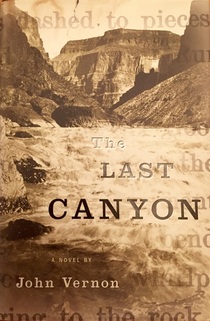
The Last Canyon
Publisher: Houghton Mifflin
Paperback: Mariner Books
Ebook: Houghton Mifflin
Nominated for the IMPAC Dublin Award
In 1869, the one-armed Civil War hero, John Wesley Powell, launched four boats on the Green River in Wyoming Territory, beginning what would be the last major voyage of discovery in American history, through the country’s only remaining terra incognita: the remote and barren course of the Colorado River. Powell believed that the inaccessible canyons of the Colorado were uninhabited. He was wrong. What he called “the great unknown” was in fact well known by a band of Paiute Indians, the Shivwits, who had lived on the North Rim of the Grand Canyon for centuries. The Last Canyon tells two converging stories in alternating chapters: that of Powell and his crew’s voyage of discovery, and that of a family of Shivwits making their own harrowing circuit of the Grand Canyon in an attempt to rescue their daughter, who’d been kidnapped by the Navajo. As the stories come together, the fates of the two groups join in tragedy. Powell finishes his voyage with only two boats, not four, and five men out of the original nine. The Shivwits find their missing daughter but also discover that a home they’ve known for centuries has been irrevocably changed. Their world is disappearing even while that of Powell and his crew of European-Americans is expanding. The Last Canyon traces simultaneously a chronicle of discovery and a voyage of loss, all encompassed in a physical and emotional geography of frightening beauty.
“With his latest book Vernon has delivered his masterpiece.” ‒ The Seattle Times
“Both gritty and sublime” ‒ The Chicago Tribune
“A novel that borrows the exactitude of history, that lets us trust the country in which [Vernon] sets us down, seeing as if with Paiute eyes or mapping, like Powell, with sextant in hand.”
‒ The New York Times Book Review
“A rousing story of adventure and exploration.” ‒ Bookpage
“Richly imagined . . . Vernon injects the saga of the Powell expedition with an even stronger dose of irony, tension, and tragedy than history itself provides, and thus does The Last Canyon leave us with both a plausible explanation of an old mystery and an augury of what will follow in the wake of Powell’s famous river-boats.” ‒ The Los Angeles Times